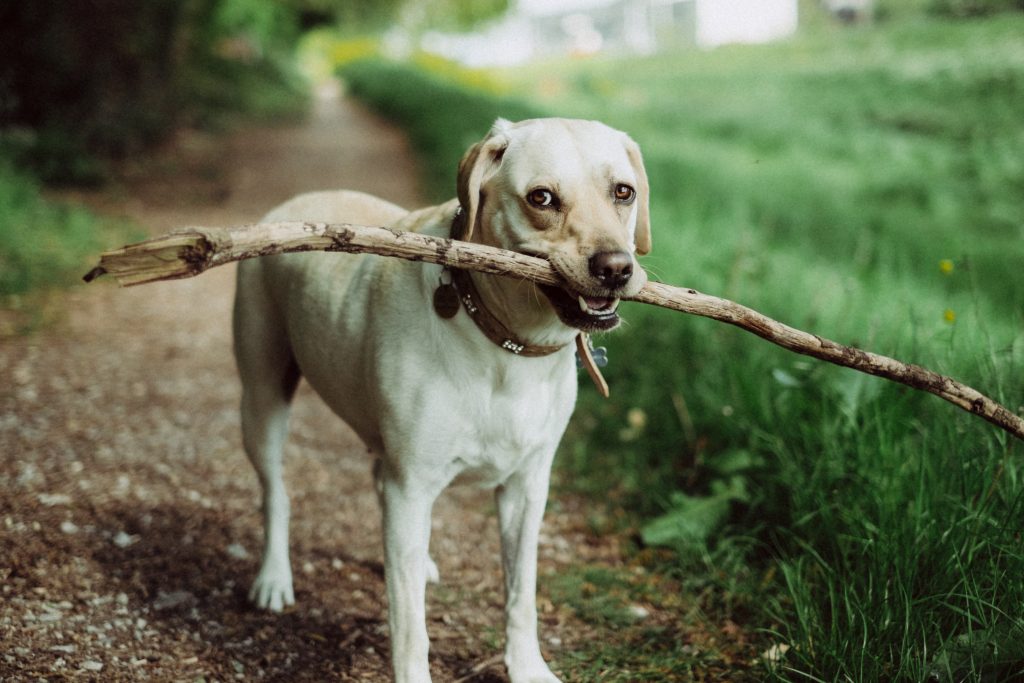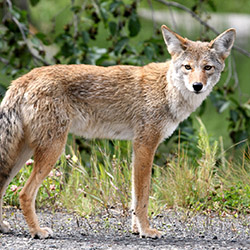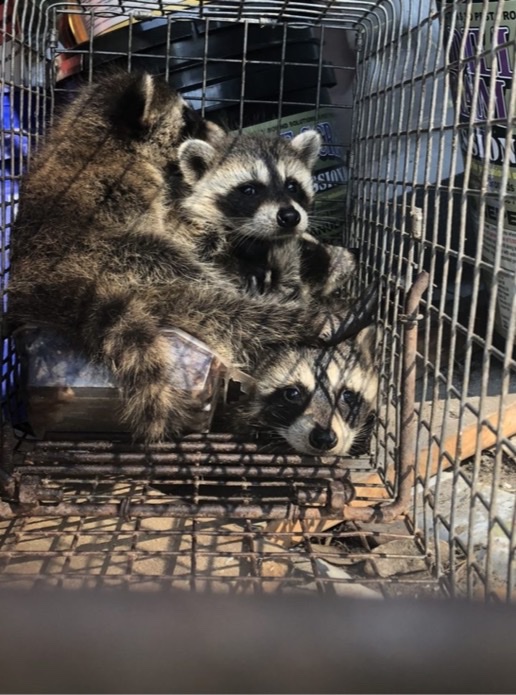An animal inside your home should always be handled immediately. But when you are dealing with wildlife in your yard, it is difficult to know how (or even if you should) to solve the nuisance.
If you have a pet that goes into your yard, you need to protect your pet from the wild animal. Many animals like rats, mice, opossums, and raccoons carry fleas, ticks, and lice. If these animals frequent your yard, your pets can be affected by these ectoparasites.
WILDLIFE DANGERS TO PETS

IS WILDLIFE URINE & FECES HARMFUL TO PETS?
All animals are curious, including pets like dogs and cats. Many diseases are carried through animal waste. For instance, raccoon and skunk feces can carry Baylisascaris roundworms. If ingested by your pet, your pet can be infected with Baylisascaris infection, which can be deadly.
Pets often get sick from something they have eaten outdoors, and it is difficult to know what causes them to be ill unless you keep your eyes on your pets when they are outside. Inspecting your yard on a regular basis and disposing of any fecal matter will protect your pets’ health.
RABIES
Many nuisance wildlife animals like raccoons, skunks, bats, armadillos, and coyotes carry rabies, which is a fatal disease. Rabies is transmitted through saliva and most commonly through a bite. To best avoid rabies transmission, ensure your pets are vaccinated.
ANIMAL ATTACKS
Understandably, any pet-owner would still be startled by their pet getting into a fight with another animal. Because of your pet’s prey drive, curiosity, or need to be protective, your pet may attack a strange animal entering their private space. Attacks can result in bites, cuts, scratches, infection, and possibly death. However, most wildlife animals will run away from your pet before an encounter happens.
DO RACCOONS EAT CATS?
Raccoons and cats often get into attacks over food since many homeowners leave cat food outdoors. In addition, raccoons tend to be more aggressive if they are providing for their young. If in a desperate search for food, raccoons may even kill and eat kittens or cats.
ARE COYOTES DANGEROUS TO MY PETS?
Coyotes will eat cats and small dogs. If you have a small pet and have seen coyotes in your neighborhood or sightings have been reported, it is best to leash your pet until the problem is resolved. Trutech Wildlife Service offers coyote trapping for HOAs as well as for individual residential properties.
Do you think you have coyotes in your neighborhood?

ARE ARMADILLOS DANGEROUS TO MY PETS?
Armadillos carry leprosy, a disease that causes nerve damage and skin lesions. Though transmission is rare, the disease is transmitted through nasal secretions. As a precaution, if you have an armadillo burrow on your property, do not allow your pets to investigate it. Armadillos are nocturnal and have poor eyesight. They will not attack your pet but will defend themselves if your pet attacks.
THE DANGER OF SNAKE BITES
For many pets, catching a snake may seem like a game. However, snakes will bite your pet in order to defend themselves. If your pet is bitten by a non-venomous snake, infection or swelling can occur, but if your pet is bitten by a venomous snake, medical attention should be received immediately as a venomous bite could lead to the loss of a limb or death. In this instance, it is important to note any physical aspects of the snake for the snake to be identified.
If your pet is bitten by a snake and you are unsure of whether the snake was venomous or non-venomous, seek emergency veterinarian care immediately.
WHAT SHOULD I DO IF A SKUNK SPRAYS MY DOG?
Pets are often sprayed by skunks because they are startled by them. If your pet approaches a skunk out of curiosity or protection, it is likely your pet will be sprayed. Not only will you have to deal with the smell of the spray, but the spray can irritate your pet’s eyes, and if ingested, it is likely that your pet will become ill. Common side effects are vomiting and diarrhea. At the first sign of illness, it is best for your pet to see a vet.
SKUNK SPRAY REMEDY
- Mix 1 quart of 3% hydrogen peroxide, ¼ cup baking soda, and 1 tsp of liquid dish soap.
- Use gloves and thoroughly rub the formula on your pet’s coat, rinse the formula, then use pet-friendly shampoo. Repeat these steps if needed.
- Do not save or bottle the de-skunk solution as the chemical reaction will cause a container to explode.
- Be very careful not to get the de-skunk solution in your pet’s ears, eyes, or mouth.
PREVENT NUISANCE WILDLIFE IN YOUR YARD
DO MOTHBALLS KEEP ANIMALS AWAY?
Moth balls pose many risks to humans, animals, and the environment and should never be used as a solution to get rid wildlife like skunks, raccoons, snakes, or any other nuisance animals from your yard.
You may have heard of the phrase, “the label is the law.” Because mothballs are registered by the U.S. Environmental Protection Agency, it is a Federal law violation to use them in a way that is inconsistent with the label. The proper PPE to use while handing mothballs includes protective gloves/clothing including a long-sleeved shirt, long pants, chemical-resistant aprons, impervious gloves, and antistatic boots.
Moth Ball Dangers:
- May be fatal if swallowed
- May cause genetic defects
- May cause cancer
- Moth balls are flammable
- Moth balls should not be exposed to a person’s skin
- Moth balls are very toxic to aquatic life
- Moth balls are harmful to breathe
- Moth balls can produce lung damage and even pulmonary edema
Mothballs are not a solution to a wildlife problem, especially if you are concerned about the safety of your family and pets. Trutech Wildlife Service offers safe and humane removal and control methods to ensure the safety of your family, your pets, and the environment.
ARE LIVE TRAPS DANGEROUS TO PETS?
If an animal cannot be physically captured and removed, live trapping allows another way for our Wildlife Specialists to safely and humanely remove animals from your property. We use bait to attract the nuisance species but not your pet. Our live traps are checked daily in order to provide the least stressful experience for the animal(s).
TRAPPING AND PETS
We always take precaution when deciding on the placement of the trap. It is extremely rare to accidentally trap a pet in the trap, however, the traps are completely safe. If a pet is accidentally trapped, the door can be opened very easily allowing the pet to exit safely and freely. Dogs and cats are very smart, and if accidentally trapped, they will not go back to the cage. However, we will ensure the trap is placed on an area that the homeowner is comfortable with and allows safety to any pets.

HOW TO KEEP YOUR YARD FREE OF NUISANCE WILDLIFE
- Avoid using bird feeders.
- Refrain from using birdbaths or decor that provides a water source.
- Keep pool enclosed area or covered at night.
- Do not leave food outside.
- Keep shrubbery well kept.
- Ensure your yard is free of brush/debris/nesting material.
- Pick fruits/vegetables as soon as they are ready.
Every animal has a role in the ecosystem and can be a benefit to have around. For example, skunks will help keep snakes away because they are immune to snake venom and snakes are a part of their diet, and opossums eat fleas, ticks, and lice.
If a current wildlife issue is present, keep your pets on a leash when outside to avoid any encounters until your yard is free of nuisance wildlife.


